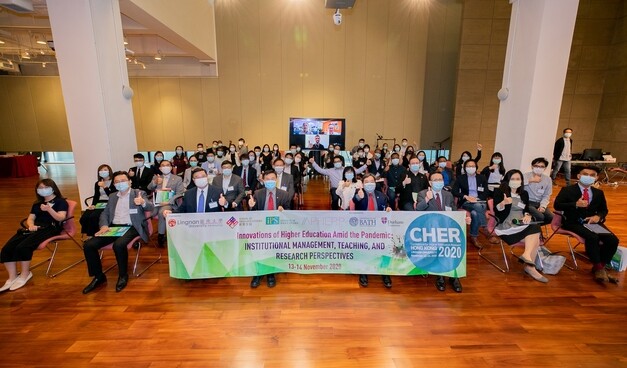

Lingnan University (LU) hosted the annual Conference for Higher Education Research (CHER) 2020 On 13 and 14 November, offering the education sector a chance to take stock of the valuable lessons that have already been learned, and propose ways forward into a radically different, post-COVID future.
Organised by LU School of Graduate Studies, Institute of Policy Studies and the Asia Pacific Higher Education Research Partnership in collaboration with the UK’s University of Bath and Durham University, the theme of this year’s conference was Innovations of Higher Education Amid the Pandemic: Institutional Management, Teaching, and Research Perspectives. Ninety distinguished speakers from 13 countries and regions discussed their ideas and analysis with both in-person and online audiences.
In his opening remarks, Carlson Tong Ka-shing, Chairman of Hong Kong’s University Grants Committee, hailed the way in which universities have coped with the upending of their usual teaching practices, while accepting the move to online learning has thrown up its own challenges. “Have we done enough to ensure fairness and the integrity of virtual assessments?” he wondered. “Do students enjoy sufficient access to peer support, teaching staff and resources after virtual classes?”
The conference began with a dialogue between an eminent group of academics and industry leaders on the Future Development of Higher Education in Hong Kong after the COVID-19 crisis.
Joseph Luc Ngai, Managing Partner, McKinsey’s Greater China Office, described what the capabilities industry will be looking for in future: with soft skills at a premium, he suggested kindergarten teachers probably have the greatest job security. But even though few jobs will disappear completely, he predicted that every form of employment will be affected by digital technology and everyone will have to be able to change in response: “The world needs more leaders and fewer managers,” he said.
Former HKSAR Financial Secretary John Tsang told the conference that he wants to see Hong Kong’s world class universities help to evaluate the innovative products the huge and growing EdTech sector is devising, citing a potentially exciting example from one US-based business, Beyond Labz, which offers open-ended, virtual-laboratory experiments in chemistry, physics, biology and the physical sciences.
Prof Anthony Cheung, Chairman of the Government’s Committee on Self-Financing Post-Secondary Education, noted that private higher education institutions in Hong Kong have taken the greatest hit during the pandemic. “We have to adjust the expectations of both students and teachers,” he stated, before predicting institutions operating in this sphere will need to place a greater emphasis on professional and vocational training from now on.
Prof Wong Yuk-shan, President of the Open University of Hong Kong, expects education spending to continue to grow in the Greater Bay Area, unlike many other parts of the world. He therefore welcomed the fact several of the SAR’s universities have opened campuses across the border. “Research opportunities and funding in Hong Kong are rather limited because we don’t have big corporations; we don’t have a lot of industrial R&D, unlike in the GBA.”
Summing up, Kenn Ross, Managing Director of Asia, Minerva, which offers multi-location undergraduate education, said he wants the CHER conference to be a call to action. “As horrific as COVID has been for so many people around the world, for education it is acting as a very powerful catalyst for change.”
The first morning of the conference also featured the ceremony launching Lingnan’s new Institute of Policy Studies. In partnership with a number of leading universities around the world, the Institute supports comparative and international research in policy studies, and complements the University’s excellent professional training in policy, development and governance studies.
There were also five keynote speeches delivered by renowned international scholars Prof Andrea Abbas, Professor of Sociology of Higher Education, University of Bath, UK; Prof Angela Hou Yung-chi, Professor of Education, National Chengchi University, Taiwan; Prof Joshua Mok Ka-ho, Vice-President, and Lam Man Tsan, Chair Professor of Comparative Policy, Lingnan University; Prof Susan Robertson, Professor of Education, University of Cambridge, UK; and Prof Jandhyala BG Tilak, Former Professor and Vice Chancellor, National University of Educational Planning of Administration, India.






































